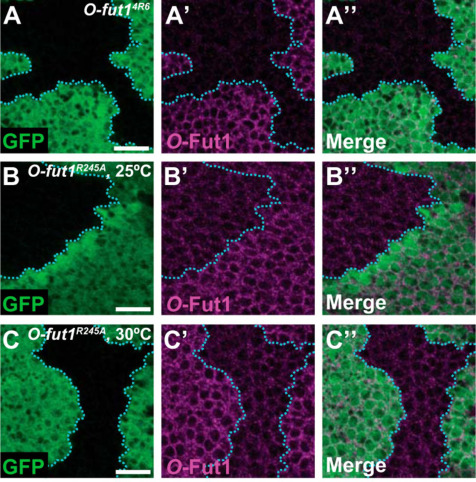論文

Akira Ishio, Takeshi Sasamura, Tomonori Ayukawa, Junpei Kuroda, Hiroyuki O Ishikawa, Naoki Aoyama, Kenjiroo Matsumoto, Takuma Gushiken, Tetsuya Okajima, Tomoko Yamakawa, Kenji Matsuno
O-fucose monosaccharide of Drosophila Notch has a temperature sensitive function and cooperates with O-glucose glycan in Notch transport and Notch signaling activation.
J Biol Chem, Jan 2;290(1):505-19, (2015).
DOI: 10.1074/jbc.M114.616847
解説
Notch (N) is a transmembrane receptor that mediates the cell-cell interactions necessary for many cell fate decisions. N has many epidermal growth factor-like repeats that are O-fucosylated by the protein O-fucosyltransferase 1 (O-Fut1), and the O-fut1 gene is essential for N signaling. However, the role of the monosaccharide O-fucose on N is unclear, because O-Fut1 also appears to have O-fucosyltransferase activity-independent functions, including as an N-specific chaperon. Such an enzymatic activity-independent function could account for the essential role of O-fut1 in N signaling. To evaluate the role of the monosaccharide O-fucose modification in N signaling, here we generated a knock-in mutant of O-fut1 (O-fut1R245A knock-in), which expresses a mutant protein that lacks O-fucosyltransferase activity but maintains the N-specific chaperon activity. Using O-fut1R245A knock-in and other gene mutations that abolish the O-fucosylation of N, we found that the monosaccharide O-fucose modification of N has a temperature-sensitive function that is essential for N signaling. The O-fucose monosaccharide and O-glucose glycan modification, catalyzed by Rumi, function redundantly in the activation of N signaling. We also showed that the redundant function of these two modifications is responsible for the presence of N at the cell surface. Our findings elucidate how different forms of glycosylation on a protein can influence the protein's functions.The requirement of O-fucose monosaccharide on Notch is not fully understood.
